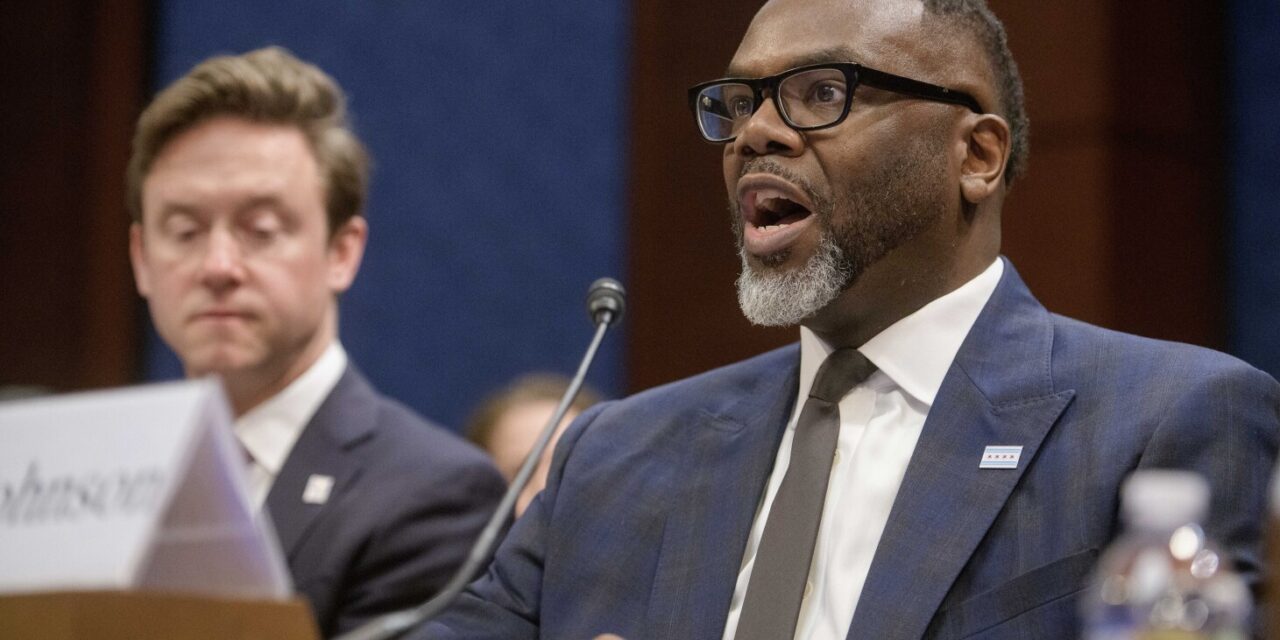
A heavily rehearsed Mayor Brandon Johnson survived Wednesday’s congressional interrogation from conservative lawmakers who grilled Democratic mayors representing sanctuary cities, as President Donald Trump forges ahead with his mass deportation effort.
Wednesday’s six-hour political theater could have provided Johnson with the opportunity to fire up his progressive base — and potentially boost public approval ratings that have plunged to single digits, according to the most recent poll.
Instead, the mayor’s testimony often sounded scripted in a showing that nevertheless accomplished the embattled Chicago mayor’s main goal: to simply get through it.
Unlike two of his impassioned counterparts at the hearing, Boston Mayor Michelle Wu and Denver Mayor Mike Johnston, Johnson provided sometimes robotic answers to questions posed by committee members, seldom veering off the script he has used repeatedly in Chicago.
Johnson acknowledged Chicago’s Welcoming City Ordinance and a companion state law, known as the Illinois TRUST Act, do “not permit our local law enforcement “ to cooperate with federal Immigration and Customs Enforcement.
“With a criminal warrant, our city and state will cooperate. But without a criminal warrant, our local law enforcement focuses” on fighting local crime, Johnson said.
Other parts of his opening statement sounded like a reelection stump speech.
“As mayor, I’m building a Chicago that embodies the dream of my father when he came from Sallis, Mississippi, during the Second Migration, a Chicago that’s investing in housing, health care, jobs and education,” Johnson said. “We are ready to partner with you on the measures we know promote trust and create sustainable public safety.”
Repeatedly arguing that “nothing is more important to me than the safety and the well-being” of Chicago residents, Johnson touted decreasing violent crime statistics and asserted sanctuary policies promote public safety. “When there is trust between residents and police, undocumented immigrants come forward to report crimes and provide information to solve crime,” he said.
Tough questions
If sometimes appearing less comfortable than Johnston or Wu — a native of suburban Barrington — Johnson still held his own under hostile questioning from the GOP-majority panel.
The main thrust of Republicans’ criticism of the Democratic mayors is that sanctuary city policies violate the supremacy clause of the U.S. Constitution, which holds that federal law takes precedence over state laws. That prompted a pair of GOP congressmen to suggest Johnson and the other mayors should face criminal charges.
“You have violated your oath of office. You’ve committed a crime,” GOP Alabama Rep. Gary Palmer told the mayors. “I don’t understand why we haven’t been discussing obstruction of justice.”
Migrants from Venezuela take shelter in the Jefferson Park District police station in May 2023.
Rep. Clay Higgins, R-La., all but suggested Johnson and his counterparts should be charged with obstruction of justice for not abiding by President Donald Trump’s mass deportation campaign. “One of you said you’re willing to go to jail. We might give you that opportunity, good mayor.”
Many legal experts contend the 10th Amendment — which holds that powers not explicitly granted to the federal government by the Constitution are reserved to the states — prevents federal officials from forcing states to cooperate.
Getting personal
That’s not the position of South Carolina Republican Rep. Nancy Mace, who tried to get a yes or no answer from Johnson on whether it’s “acceptable for illegals who commit heinous crimes to be released back into the public.”
Mace cut off Johnson as he tried to launch into a nuanced answer.
“This is why you have a 6% approval rating: Because you suck at answering questions,” she said, joining a line of Republicans who took hard shots at the freshman mayor.
Rep. Byron Donalds, R-Fla., pressed Johnson on how much money Chicago has spent on the migrant crisis. Johnson said it accounted for about 1% of the city’s overall budget over four years but couldn’t offer a specific number.
“If you don’t have a hard number, you’re not running your city well,” Donalds told Johnson.
Chicago’s 2025 budget is $17.1 billion. One percent of that would be a staggering $171 million.
Under questioning from Pennsylvania Republican Scott Perry, Johnson was asked to define Chicago’s 40-year-old sanctuary city policy.
“You have welcomed 51,648 aliens to your sanctuary city. So I ask you: Sanctuary from what?” Perry said.
Johnson replied, “If you’re referring to the number of individuals that were bused by [Texas Gov. Greg] Abbott without any coordination — the 52,000 individuals that were seeking asylum — those individuals were bused to us.”
Johnson said he “passed a bus ordinance to work to coordinate with” Abbott, but “he refused to do that.”
“So, you don’t care about federal law enforcement policies. Only local policies,” Perry later said. Johnson stood his ground.
“We comply with all laws. What I do care about is this body — Washington — passing comprehensive immigration reform,” Chicago’s mayor replied.
Texas GOP Rep. Brandon Gill was determined to embarrass Johnson, bringing up extraneous issues that had nothing to do with the sanctuary city ordinance. He talked about the gifts Johnson has accepted on the city’s behalf and about the mayor’s secretive handling of those items.
“You’re providing an enormous amount of aide to illegal aliens, aiding and abetting criminals who have come into our country illegally. And you yourself are receiving an enormous amount of gifts. And you won’t even tell us who they’re coming from,” Gill told Johnson.
A visibly irritated Johnson paused after noting the gifts weren’t personally given to him.
“I was invited to respond to the questions around welcoming cities,” the mayor said.
Backing from Democrats
Democrats came out swinging just as hard in defense of the four mayors.
Rep. Melanie Stansbury, D-N.M., branded Wednesday’s marathon hearing “absolute bull—-t” and nothing more than a stage for grandstanding Republicans. “They are not making America safer again. What they are doing is terrorizing immigrant families,” she said.
Also taking some of the heat off Johnson was New York Mayor Eric Adams, who was repeatedly interrogated about the Trump Justice Department’s decision to put federal corruption charges against Adams on hold so long as he cooperates with the president’s mass deportation efforts.
New York City Mayor Eric Adams (from left) greets Boston Mayor Michelle Wu during Wednesday’s Capitol Hill hearing as David J. Bier, director of immigration studies at the Cato Institute, looks on.
“The only permissible way to refuse to answer a question during a congressional proceeding such as this is by pleading the Fifth Amendment,” Rep. Alexandria Ocasio-Cortez, D, N.Y., said as Adams repeatedly declined to talk about the case.
Johnson also got an assist from Illinois Democrat Raja Krishnamoorthi, whose district includes the mayor’s boyhood home of Elgin.
Krishnamoorthi followed his glowing introduction of Johnson with questions so friendly, they were more like a Chicago lovefest.
The congressman noted Trump has unfairly portrayed Chicago as so violent, it’s “worse than Afghanistan.”
In response to Krishnamoorthi’s scripted questions, Johnson articulated Chicago’s many assets, including O’Hare Airport, its many Fortune 500 company headquarters and its position as the nation’s largest rail hub.
“That doesn’t sound like Afghanistan to me, sir, does it?” Krishnamoorthi asked.
Johnson replied, “The city of Chicago is a beautiful place. We also have 20% of the world’s fresh water right in our front yard. Our restaurants are amazing. In fact, everything that is dope about America comes from Chicago,” he said, quoting Chicago historian Shermann “Dilla” Thomas.
Local reaction
Ald. Andre Vasquez (40th), Johnson’s hand-picked chair of the City Council’s Committee on Immigrant and Refugee Rights, gave Johnson decent reviews for Wednesday’s performance.
“It was definitely steady. Do no harm is kind of what it felt like. In that regard, mission accomplished,” Vasquez said.
“What stood out most was some of the Republican congressmen being almost extremist. They were trying to take shots and create viral footage. Against that backdrop, Johnson was doing himself a favor by doing no harm.”
Ald. Gilbert Villegas (36th), former chair of the Council’s Hispanic Caucus, said the mayor and the city were well-served by Johnson’s decision to stick to the script.
“He listened to the consultants he hired — I’ll be interested to see how much that cost — wisely understanding that he’s being sued, so the things you say can be used against you,” Villegas said. The Trump administration is suing Illinois, Cook County and Chicago over its sanctuary law and policies.
“This is not about the mayor. This is about making sure that the city is viewed in a positive light given the fact that Trump has attacked Chicago ever since he got in,” he said.
South Side Ald. David Moore (17th), a Johnson critic, said some sound bites from Wednesday’s hearing could hurt the mayor because his answers could remind African Americans in particular of the “what about me” debate caused by the migrant crisis.
“Not that the anger and frustration had totally dissolved. But those comments — when they get played on YouTube and other places — are going to continue to frustrate people because they feel those resources should have gone to them,” Moore said.
Lawrence Benito, executive director of the Illinois Coalition for Immigrant and Refugee Rights, said Johnson “stuck to the script” on the advice of counsel and was justifiably “cautious in his responses” at a time when the city, county and state are in an “active lawsuit.”
“He had a message going in, and he stayed on message, consistent with what he has said since he’s been in office,” Benito said. “But this committee wasn’t looking for real answers, either. They were looking for a gotcha moment. And instead, it was a draw.”





